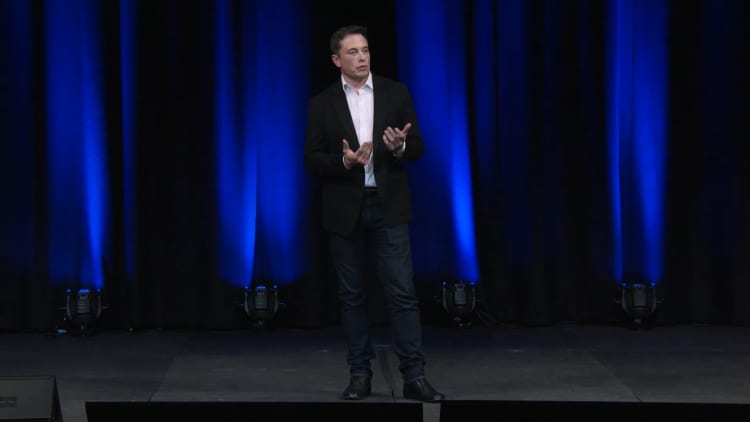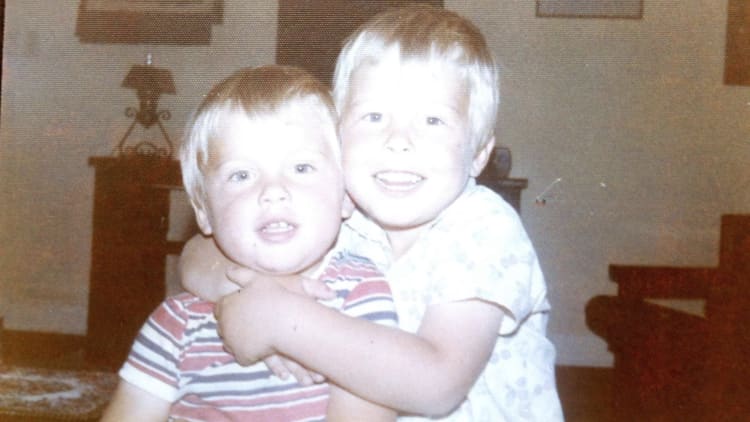Forty-six-year-old tech titan Elon Musk is currently worth more than $20 billion, according to Forbes.
But the Tesla and SpaceX boss hasn't always been so wealthy. On Saturday, Musk tweeted about the early years of his career.
"I arrived in North America at 17 w $2000, a backpack & a suitcase full of books. Paid my own way thru college. Dropped out of Stanford Eng/Phys grad school w $110k in college debt. Created Internet startup w bro & Greg Khouri (love bro & loved Greg, may he RIP)," the billionaire tweeted on Saturday.
Musk was born in in Pretoria, South Africa, he said in an interview with entrepreneur and investor Kevin Rose published on YouTube in 2012. Musk also lived in Johannesburg and Durban in South Africa but wanted to move to America.
"It always seemed like when there was cool technology or things happening, it was kinda of in the United States. So, my goal as a kid was to get to get to America basically," Musk told Rose.
Musk's first stop in North America was in Canada, where his mother was born. Musk filled out the required forms to get both his mother — and then himself — a Canadian passport, he said in a 2013 interview at the Computer History Museum.
"Within three weeks of my getting my Canadian passport, I was in Canada," said Musk. He spent a few years in Canada at Queen's University, he says, and then got a scholarship to go to the University of Pennsylvania.
He didn't know he wanted to be an entrepreneur, he said.
"I actually wasn't sure what I wanted to do growing up. I think at one point I thought inventing stuff or creating things would be a cool thing to do. But I wasn't really sure if that meant starting a company or whether that meant working for a company that made cool stuff," Musk told Rose.

Musk moved to Silicon Valley to attend Stanford University graduate school. He tried, and failed, to get a job at Netscape Communications, the company that created the first web browser, Netscape Navigator.
"In '95 I kinda thought the Internet would be something that would change the world in a major way and I wanted to be a part of it. Actually, what I first tried to do, was I tried to get a job at Netscape. I wouldn't actually try to start a company, I'd try to get a job at Netscape," he told Rose.
He even took to hanging around the Netscape lobby hoping to get a job there.
"I didn't get any reply. I mean I had a physics and economics degree, or physics and business degree from Wharton, and I was doing grad studies in applied physics and materials science. I guess that... I mean, I didn't have a computer science degree or several years working at a software company," he tells Rose. "For whatever reason, I didn't get a reply from Netscape and I actually tried hanging out in the lobby, but I was too shy to talk to anyone. So I'm just like standing in the lobby.
"It was pretty embarrassing. I was just sort of standing there trying to see if there's someone I could talk to and then I just couldn't, I couldn't… I was too scared to talk to anyone. So then I left."
Musk left Stanford to start Zip2, which was founded in 1996, according to Crunchbase.
"I was just writing software that summer, and it got to the start of the quarter for Stanford and I had to make a decision, so I decided to go on deferment. I figured if I start a company and it doesn't work, then I can always go back to grad school," Musk told Rose. "So I talked to the chairman of the department and he let me go on deferment, and I said I'd probably be back in six months and he said he was probably never going to hear from me again, and he was correct. I've never spoken to him since."
Zip2 aimed to bring media companies to the internet, he told Rose. The "initial idea was to create software that could help bring the media companies online. So we helped, in a small way, bring companies like New York Times, Hearst, Knight-Ridder and so forth, bring them online. They weren't actually always online — people don't realize that," Musk told Rose in 2012.
Saturday, Musk Tweeted about his work at Zip2.
According to Musk, his work with Zip2 in the 1990s is the reason he understands the way newsrooms work now. Musk has gone on tweet storms criticizing the media recently (one of which attracted anti-semitic rhetoric) and said he wants to launch a platform to rate the credibility of journalists, which he plans to call, Pravduh. "Pravda" means "truth" in Russian.
At the end of May, Musk tweeted that he had bought the domain name Pravduh.com.
Problem solved, was able to buy http://Pravduh.com ! Game on …
Musk also dropped cryptic clues in March that he was launching an "intergalactic media empire," called "Thud!" for which he reportedly tapped editors from The Onion.
As for Zip2, Compaq bought the company in 1999. Musk said that, at the time, he had to choose between buying a house and a sports car with his windfall. He opted for the sportscar, he tweeted.
Musk wrecked that car, a McLaren F1, in 2000 while driving with his PayPal co-founder Peter Thiel, he revealed in a 2012 interview with PandoDaily.
"Peter said, 'So what can this do?' and like probably No. 1 on the list of famous last words, I said, 'Watch this.' So I floored it and did a lane change on Sand Hill," said Musk, referring to the famous Silicon Valley road. "We hit an embankment, like a 45-degree embankment on Sand Hill, which tossed the car into the air like a discus and it kept rotating with about three foot of air clearance."
Saturday's tweets from Musk about his early years came after he revealed some details about a SpaceX version of the Tesla supercar, the Roadster.
While the idea of a rocket-powered Tesla may feel like a joke, Musk insists he is serious.
See also:

Like this story? Like CNBC Make It on Facebook


